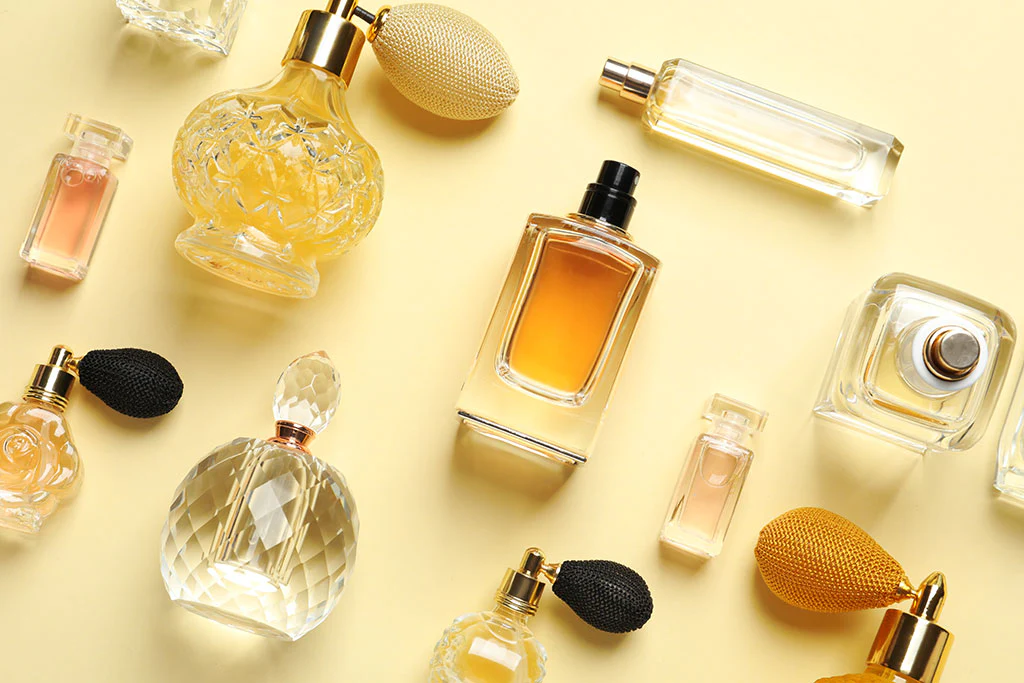The debate between natural and synthetic ingredients in perfumery has captivated fragrance enthusiasts for decades. While natural ingredients are often associated with authenticity and complexity, synthetic components offer innovation, consistency, and sustainability. But what’s really in your perfume formula? In this guide, we’ll break down the differences, bust myths about “clean” perfumes, and highlight the safe synthetics shaping modern fragrances.
Table of Contents
ToggleUnderstanding Natural vs. Synthetic Ingredients
Natural Ingredients
Natural ingredients are derived from plants, animals, or minerals using methods like steam distillation, solvent extraction, or enfleurage. They include essential oils (e.g., rose oil), resins (e.g., frankincense), and animal-derived compounds like ambergris (historically).

Pros:
- Rich and complex scent profiles that evolve uniquely on the skin
- Aromatherapy benefits (e.g., lavender for relaxation)
- Perceived as eco-friendly when sustainably sourced
Cons:
- Limited availability due to agricultural cycles and climate conditions
- Inconsistent scent profiles across batches
- Shorter shelf life compared to synthetics
Synthetic Ingredients
Synthetic ingredients are lab-created molecules designed to replicate or enhance natural scents or create entirely new ones (e.g., aquatic or metallic notes).

Pros:
- Greater stability and longer-lasting compositions
- Ethical alternatives to animal-derived ingredients like musk
- Cost-effective and scalable production
- Expanded creative possibilities for perfumers
Cons:
- Perceived as less “authentic” by some consumers
- Potential environmental concerns if non-biodegradable
Busting Myths About “Clean” Perfumes
The term “clean perfume” often implies natural ingredients free from synthetic chemicals. However, many clean perfumes still contain synthetic components to enhance stability and longevity. This marketing tactic, known as greenwashing, can mislead consumers into believing products are entirely natural when they’re not.
Key Points:
- Transparency is vital: Brands like Skylar disclose their full ingredient lists to align with consumer expectations for clean beauty4.
- Synthetic doesn’t mean unsafe: Many synthetics are rigorously tested for safety and are less likely to cause allergic reactions than some potent essential oils3.
The Role of Synthetics in Sustainability
Synthetic ingredients have revolutionized perfumery by addressing ethical and environmental concerns:
- Reducing Overharvesting: Synthetic musks replace animal-derived musks, while lab-created sandalwood reduces deforestation risks6.
- Eco-Friendly Production: Controlled lab environments minimize resource exploitation compared to large-scale farming of botanicals7.
- Biodegradable Innovations: Modern synthetics are increasingly designed with environmental impact in mind2.
Choosing the Right Fragrance for You
When selecting a perfume, consider your priorities:
- Longevity: Opt for synthetic-heavy formulas if you want a scent that lasts all day.
- Complexity: Choose natural-based fragrances for rich, evolving profiles.
- Ethical Sourcing: Look for brands that combine sustainable practices with transparency.
Conclusion
The world of perfumery thrives on the balance between nature and science. While natural ingredients connect us to traditional craftsmanship, synthetics push the boundaries of innovation and sustainability. A well-crafted perfume often blends both worlds to deliver unparalleled depth, quality, and ethical value.
Understanding what’s really in your perfume formula empowers you to make informed choices that align with your values—whether you prioritize authenticity, longevity, or environmental impact.
FAQs
- Are synthetic fragrances safe?
Yes! Synthetic ingredients undergo rigorous testing for safety and are often less likely to trigger allergies than some natural oils. - Do clean perfumes contain synthetic ingredients?
Often yes—many clean perfumes use safe synthetics alongside natural components for stability and longevity. - Which lasts longer: natural or synthetic fragrances?
Synthetic fragrances tend to last longer due to added fixatives that enhance their staying power. - Can synthetic fragrances be eco-friendly?
Absolutely! Many modern synthetics are designed with reduced environmental impact compared to overharvesting natural resources. - How can I find transparent fragrance brands?
Look for brands that disclose full ingredient lists or participate in programs like “Clean at Sephora”.
Curious about what’s really in your favorite scents? Visit Scentsciencebeauty.com for expert insights into fragrance formulas, transparency trends, and sustainable beauty innovations! Follow us on social media for updates on the latest perfume news and tips!







